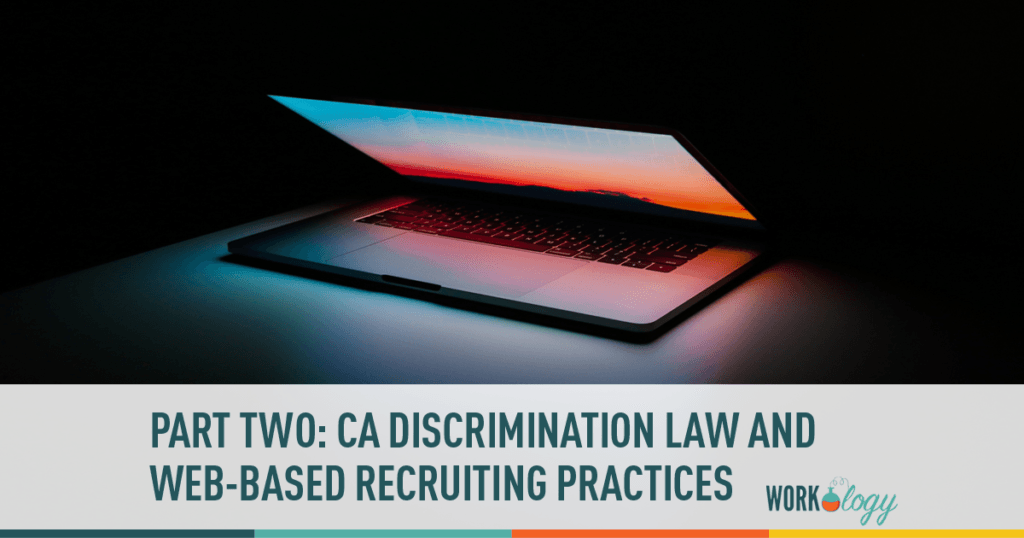Last week Mary Wright explained California discrimination law and its consideration of recruitment as a “term and condition of employment.” This week she discusses how “disparate impact discrimination” can occur through the use of Internet or software-driven recruiting practices. Read Part One on Blogging4Jobs.
So what’s the problem with Internet or (some) software-driven recruiting?
Most times, employers seek electronically stored information about the candidate that that is perfectly legitimate. For instance, millions review candidates’ LinkedIn profile pages for skills education and experience. What they may receive, no matter how innocent the inquiry, is information that may not be considered such as skin color, religious affiliation, sexual orientation, etc. While not a specific listing, those pieces of information are often disclosed in an indirect manner, such as membership in a church group, volunteer work or positions within LGBT or disability support organizations, or other personal but possibly work related information.
This is an area that has been sufficiently covered by discussions of social media recruiting. HR has a good grasp on what should and shouldn’t be considered, and what information needs to be “scrubbed” (at least until it is disclosed by interview or some intentional or direct submission by the candidate) before it is passed to an interviewer or decision maker. “Scrubbing” removes the most obvious evidence of membership in a protected class so that it is not considered in the recruitment process and, thus, prevents different or “disparate” treatment of the candidate.
What HR may overlook is the disparate impact web-based recruiting methods may have on groups of protected individuals. HR is just now learning how skewed Internet and – some – software driven recruiting methods are toward white male candidates. For instance,
“Some job search websites estimate that up to 75 percent of their applicants are Caucasian males under 40.”
Id. at 74, fn 36, citing Edgar F. Johns, “Automated Hiring Solutions and Diversity,” JobApp Network, November 2008 (available at www.jobappnetwork.com).
It’s All About Access: Understanding Discriminatory Impact of Web- or Software-Based Recruiting Methods
Doug Farmer, in his book California Employment Law: The Complete Survival Guide to Doing Business in California, cautions employers to “obtain and analyze website traffic demographics before relying exclusively on any particular website for recruitment.” If an employer must rely on a particular site (due to industry limitations), he suggests that HR diversify recruitment efforts with use of other methods of recruiting.
Farmer goes on to list the following problems and possible solutions:
Use of Applicant Screening Software: While using search tools and algorithms to locate the most qualified candidates, such software’s primary purpose is to screen out unqualified candidates and to do so may use zip codes, addresses, degrees from specific schools, etc., that may not, in fact, be job related. Farmer suggest that employers work with the vendor to audit the search parameters to make sure that the search does not unwittingly create a disparate impact on members of a Protected Category.
Internet Recruiting Activities that are Incompatible with Assisstive Technology for Disabled Applicants. For instance does the program have an audio application process for the blind? Do you have TTY capabilities for deaf or hard of hearing applicants?
Use of Third Party Materials or Programs that Require Response to Prohibited Inquiries. Does your outside recruiter require a picture? Seek information about prior leaves of absence, suits against a former employer, or workers’ comp claims? Make sure you know what is being asked on your behalf before signing up for a recruiting service or platform that could expose you to liability for discrimination.
Employers that rely upon web-based recruiting methods are cautioned to review how the information is gathered and what information is collected prior to implementing the use of such methods or applications. Failure to conduct due diligence – the “I didn’t know that my vendor asked that question or excluded candidates that way” is not a defense to claims of disparate treatment or impact discrimination. When in doubt, mix it up. Make sure to employ recruiting methods that capture applicants that may not have ready access to computers and the Internet.
Find more about this topic from the Employment Law Publishers.








